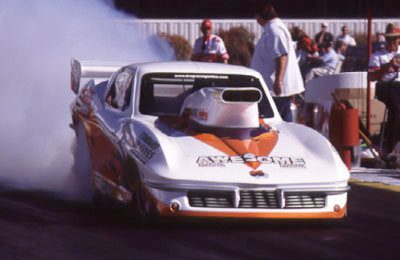|

DRO: You've talked about your "Pro Stock brotherhood." How happy
would Pro Stock drivers be to see Pro Modifieds elevated to professional
status?
HAGERTY: There are mixed feelings about us getting a pro-category
classification. They think that it's going to take some of the shine
away from what they do. They're active -- actively pursuing with NHRA
and the Big Three, Ford, Mopar and Chevrolet/Pontiac, telling their
people at race support to turn their backs to the Pro Mods because Pro
Stock sells cars at the dealership level, whereas a '66 Corvette or
a '37 Willys doesn't. They're always working against us because they're
afraid we'd take a piece of the pie, which we would. I feel our cars
are more exciting. They're harder to drive, they go faster, they have
more crowd appeal. They're a little unruly. These cars are not cookie-cutter
cars. They're very different not only in appearance and body styles,
but these guys are rebels, non-conformists. That's why they don't race
in another class.
DRO: Is that partly why NHRA is reluctant to embrace Pro Modifieds?
HAGERTY: They openly flaunt Scotty Cannon. Behind the scenes
we all know Scotty, because we've raced with him for years. He's become
more corporate because of his sponsorships, but yet he stays on the
sassy side. He does like being the bad boy. I think NHRA would welcome
that, as long as we're professional and held in check. They like the
controversy. It makes for conversation and good color on the broadcasts.
Pro Mods would give them all they could handle . . . and then some.
There's some bad blood between guys here, because many of them are gunslingers.
They shoot from the hip and it's wide open and they're rowdy and they
do things sometimes in non-conformist form.
DRO: What's the reception you've gotten from NHRA?
HAGERTY: I go to Glendora quite a bit. I've been in everybody's office
and talked about things and waved my flag and done my spiel. I think
they want us, but they don't want to pay out of their own pocket. That's
why a sponsor had to be found for the package deal.
DRO: Does it irk you that the Top Fuel and Funny Car classes,
for instance, individually don't have to do that?
HAGERTY: In our ranks we've talked about that quite a bit.
DRO: But in general you're happy with NHRA's treatment?
HAGERTY: When we meet with them individually, they're very open.
They know the difference between our cars and they follow with our performance.
They ask us what the cars are like, what we like to drive, and they
ask us about the cost involved. They do sidestep the issue about the
tag of being a pro class. I think, as a whole, there's quite a few of
them who do understand what we're doing. I haven't heard anything that
was disrespectful towards us. There's a few people who make the decisions
at the top and if you don't catch them in the right mood, we're just
another bunch of whiny racers who want things our way. Not all of them
have realized the true potential and value of our class. At every race
they see the caliber of our cars, they see the fan following. But there
is some hesitation for change at the top.
DRO: No doubt the pending Pro Stock Truck litigation has affected
how NHRA can and does deal with you. When the truck class downgraded
to sportsman status, you had to know that wasn't going to help your
cause.
HAGERTY: There was sympathy here. Nobody here jumped up and
down because that would give us an opportunity. I think they should
have been given more notice, and it should have been done in a more
business- and family-oriented fashion. There aren't that many teams.
A personal phone call would have been good. A vice-president or assistant
could have called and said, "We're sending you a registered letter concerning
rules changes and class changes." I certainly wouldn't want it to happen
to us.
|